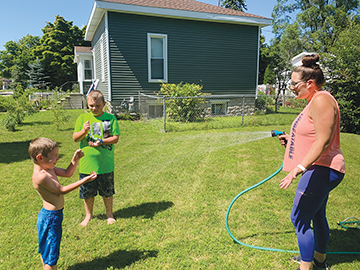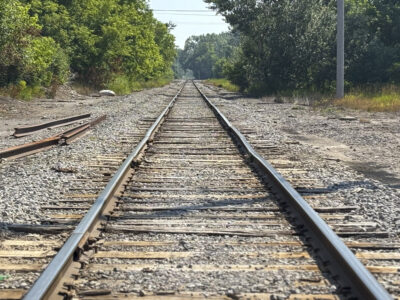Whitmer’s executive order saving hundreds from shutoff

News Photo by Steve Schulwitz Kolby and Brantley Ross receive a surprise splash of water from their mother, Casey Ross, while playing with the garden hose on Thursday at their home. Ross said she has noticed an increase in her water bill since her kids were let out of school, and, although paying the bill isn’t an issue for her family, she knows others who are struggling and amassing bills that will be hard to pay later.
ALPENA — Many residents in Northeast Michigan who can’t afford to pay their water bill because they’ve lost their job during the COVID-19 shutdown have been shielded by an executive order from Gov. Gretchen Whitmer prohibiting shutoffs.
But past-due balances continue to mount, and it is only a matter of time before it comes time to pay up.
Casey Ross, of Alpena, said she noticed a significant increase in the family’s water bill after Whitmer closed schools in March to prevent the spread of the virus and her kids were suddenly home all day every day.
She said her water has never been shut off, but she knows people who have struggled to keep up with the rising costs.
“When they are home all the time, there is more laundry, more dishes, and just a lot more water being used, so it is more expensive,” she said. “There are people who are being saved from not being able to pay their bill now, but what is going to happen when they do have to pay? I suspect it is going to be hard for some people to catch up.”
Northeast Michigan municipal water providers say they understand that the coronavirus has wreaked havoc on many people and will work with those struggling to pay their bills after the governor’s order expires at the end of the year.
As of Monday, 291 of the 4,800 total customers in Alpena should have their water service interrupted because of non-payment but are being saved by Whitmer’s order, said Mike Glowinski, utilities manager of Suez, the company hired by Alpena to provide water services.
He said the total amount owed to the city is $72,000, and the average past-due bill is $248. He said some bills are into the thousands.
The longer COVID-19 restrictions are in place, the further behind people are going to fall, Glowinski said, but the city will work with residents — if they call and ask.
“We’re always willing to work with people,” Glowinski said. “We’ll make arrangements, and, once paid in full, we’ll waive the delinquent charge to help, too. Generally, we like to have the balance paid off in three months, or before the next bill is sent out, but we are also looking at programs that might be out there to help and see what the government has to offer us and the customers.”
As of Thursday, 130 Alpena Township accounts would have been suspended, if not for the executive order, township Supervisor Nathan Skibbe said. He said the total owed to the township is $97,465.
Skibbe said the money owed the township in late water payments has actually gone down lately, as the township has begun to offer online payments and made it possible for customers to make payments at local banks and credit unions.
Skibbe said he has worked to get struggling customers assistance from the state’s Residential Emergency Water Assistance Relief Program, which is offered by the Michigan Department of Health and Human Services and Michigan Department of Environment, Great Lakes, and Energy.
“I have filled out the application and questionnaire, and hope it will help to provide help to people of low income and who are dealing with COVID-19,” Skibbe said. “It is designed to offset liability to the people in the community who need it the most right now. It basically gives debt forgiveness.”
Still, the unpaid bills could hurt government water programs, Skibbe said.
“The lost funds are a detriment to our water fund and really our Capital Improvement Plan projects as a whole,” he said.
The township buys water from the city and, as a government, isn’t protected by the executive order.
In Rogers City, Clerk Terri Koss said 49 bills are delinquent enough to warrant a disconnect under normal circumstances. Koss said the total amount owed the city is $5,748, and the average bill is $117.
——
Water shutoff, by the numbers
A look at the total number of water customers who would have their water shut off for non-payment if not for a gubernatorial executive order prohibiting shutoffs during the pandemic.
Customers Total owed Average bill
Alpena 281 $72,000 $248
Alpena Township 130 $97,465 N/A
Rogers City 49 $5,748 $117
Sources: Local governments





